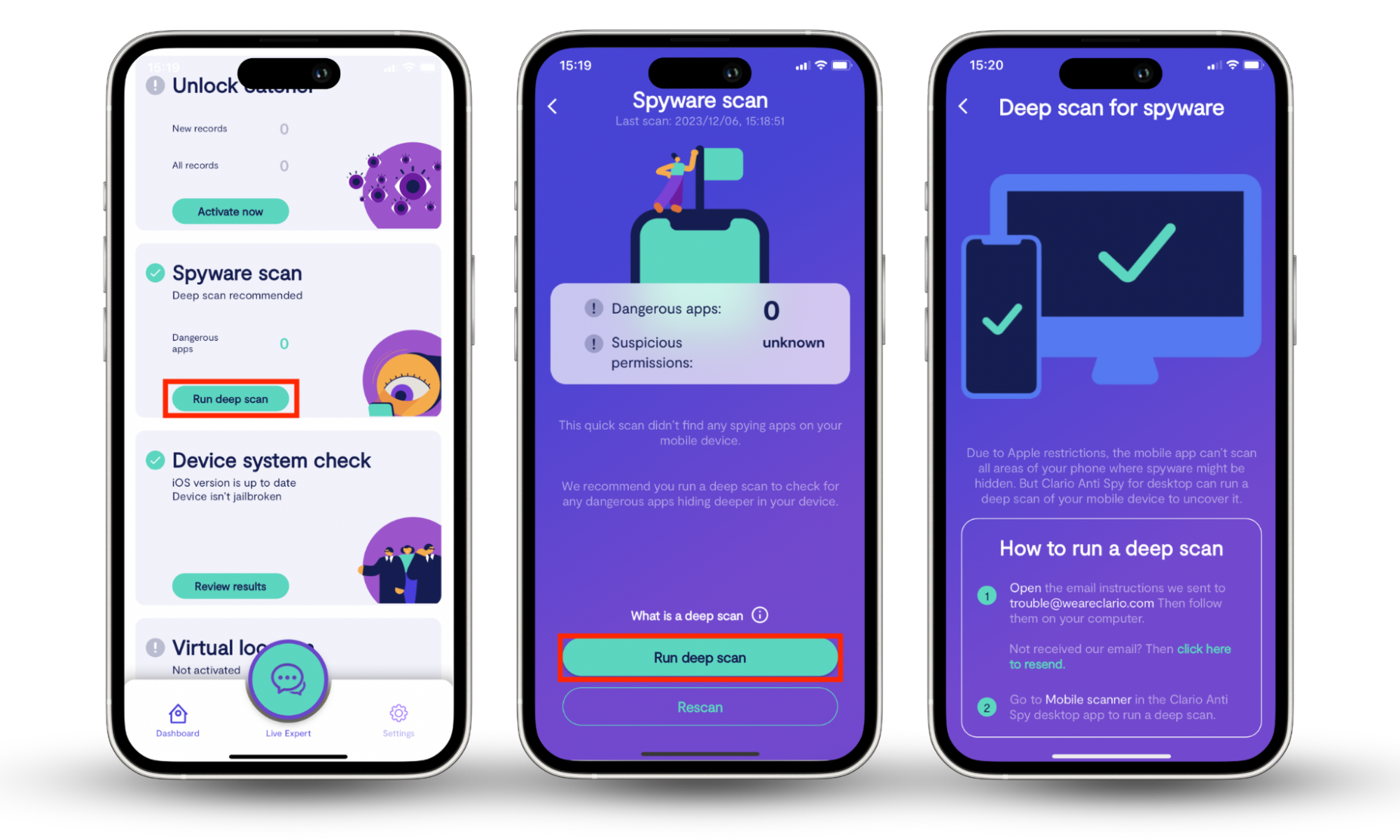Table of contents
- What is stalking?
- Signs your ex is stalking you
- Ex-partner stalking examples
- 1. Sending unwanted calls and messages
- 2. Sending unwanted gifts
- 3. Obsessive behavior
- 4. Call monitoring
- 5. Location near your home
- 6. Damage to your property
- 7. Monitoring your schedule
- 8. Collection of information about your location
- Is stalking a crime?
- What to do if your ex is stalking you
- 1. Document incidents of harassment
- 2. Share with loved ones
- 3. Be direct with them
- 4. Be vigilant of your personal safety
- 5. Contact law enforcement
- Conclusion
What is stalking?
Stalking is…
Stalking is when someone constantly follows, watches, or harasses a person without their consent. It can happen both in person or online, which is known as cyberstalking. Stalkers invade the privacy of their victims, making them feel scared, threatened, or anxious.
Signs your ex is stalking you
There are a few red flags that can indicate whether your ex is stalking you. If you notice any of these warning signs, you might have a stalker:
- They show up at your workplace or house unannounced.
- They constantly appear nearby, even when they shouldn’t know where you are.
- They ask your friends about your location.
- They comment on your social media posts more than normal, with inappropriate messages.
- They send you presents, often accompanied by inappropriate letters.
- You find tracking software and devices on your phone or in your vehicle.
Ex-partner stalking examples
Here are some examples of stalking cases to look out for:
- Sending unwanted calls and messages
- Sending unwanted gifts
- Obsessive behavior
- Call monitoring
- Location near your home
- Damage to your property
- Monitoring your schedule
- Collection of information about your location
1. Sending unwanted calls and messages
The first example of stalking is receiving unwanted calls and messages from someone, even after you’ve asked them to stop. They may use various platforms to contact you, including phone calls, emails, texts, and social media messages.
While this intrusive messaging isn’t necessarily a sign of stalking, it often accompanies stalking and leads to more invasive behaviors.
Another example is if your ex constantly monitors your online activities, posts on your social media accounts, or comments on your posts. Perhaps you’re wondering, “Why does your ex-boyfriend check your WhatsApp status?” Well, that’s why.
2. Sending unwanted gifts
Receiving unwanted gifts can be an example of stalking if someone sends them repeatedly against your wishes or without your consent.
Often, the unwanted gifts are accompanied by inappropriate messages or letters, and they can be an attempt to establish a connection or gain control over you.
3. Obsessive behavior
A stalker might become fixated on you to an excessive extent. This can lead to obsessive behavior like being preoccupied with your personal life and activities or following you around.
For example, you might notice that your ex frequently appears or lingers around you, showing up at places you often visit. They might also ask your friends about where you are or frequently drive past your house and place of work.
4. Call monitoring
What is call monitoring?
Call monitoring is when someone listens to, records, or intercepts your phone conversations without your knowledge. Not only is it a violation of your privacy, but it’s usually used by stalkers to gather information that they can use to control or intimidate you.
For instance, you might receive constant anonymous calls or notice that someone seems to have information about you that you only discussed over phone conversations. You might also notice a strange echo or noise during your calls that indicates someone else is listening in.
5. Location near your home
Having a person lingering near your home is a sign of stalking, especially when they’re there seemingly all of the time. If someone is always near your home, it’s a sign that they’re trying to track your activities, invade your privacy, or potentially make contact with you.
For example, you might notice someone is always near your house when they have no legitimate reason to be there. For instance, they might park their car nearby or constantly drive past.
6. Damage to your property
Vandalism and property damage are often used by stalkers to harass and intimidate their victims. If you notice unexplainable damage to your belongings, like your car or house, it’s a sign that someone is stalking you and trying to scare you.
Let’s say you repeatedly find your car scratched and tires punctured despite no apparent accident. It might become obvious after a couple of times that someone is intentionally damaging it to disrupt your routine or send a threatening message.
7. Monitoring your schedule
If someone is consistently keeping track of your daily routine without your permission, it’s a warning sign that they’re stalking you. This kind of monitoring lets them intrude on your life and potentially manipulate or cause harm to you.
For example, suppose your boyfriend’s ex is stalking you. Maybe they suspiciously appear at places you visit, like your workplace or social activities. They seem to know where you are at all times, even though they have no valid connection to you.
8. Collection of information about your location
A stalker might try to gather information about your location to follow you around and monitor your activities. They might do this in several ways, including following you, tracking your posts on social media, asking your friends, or even using technology to pinpoint your location.
An example is when someone keeps asking you about your whereabouts. They might message your friends and ask them, offering a weak excuse as to why they need to know. Or you might notice that they appear at places you visit, even though they shouldn’t know about your habits. These are all signs that someone is collecting information about your location and stalking you.
Is stalking a crime?
In most countries around the world, stalking is considered a crime. In the United States, for example, stalking is a federal crime, and each state has a different definition of what constitutes the crime.
Generally speaking, stalking is defined as a pattern of unwanted and harassing behavior that instills fear or distress in the victim. If a stalker is found to exhibit this behavior, they can be tried and punished in the criminal justice system.
What to do if your ex is stalking you
If your ex (or someone else) is stalking you, you need to act quickly. Here’s how to deal with a stalker ex:
- Document incidents of harassment
- Share with loved ones
- Be direct with them
- Be vigilant of your personal safety
- Contact law enforcement
1. Document incidents of harassment
If you’ve fallen victim to stalking, documenting incidents of harassment is crucial for several reasons. It can help you:
- Provide evidence. Documentation provides concrete evidence of the stalking behavior that you’ve experienced. If you decide to report the harassment to law enforcement or pursue legal action, this documentation will help establish a pattern of stalking behavior over time.
- Remember. Over time, specifics about each incident can become difficult to remember. A documented record will help you maintain an accurate account of events.
- Assess the risk. The more you record your stalker’s behavior, the easier you’ll see what level of threat you’re under and what you can do to ensure your safety.
To document evidence effectively, ensure you do the following:
- Keep all physical evidence, including letters, gifts, voicemails, etc.
- Store all digital evidence like messages or social media interactions.
- Note any witnesses who have seen the stalking behavior themselves.
- Keep a detailed log of each incident, including dates, times, locations, and a thorough description of what happened.
2. Share with loved ones
Telling loved ones that you have a stalker can help you get the emotional support you need to deal with the problem and feel safe. Sharing your experience means your loved ones can offer comfort, listen to your concerns, and help you develop a plan.
Further, it also helps others be aware of your situation so that they can remain vigilant, keep an eye out for you, and assist you when you put safety strategies into action.
You should choose a few trusted individuals—like your best friend, siblings, or parents—who you trust and feel comfortable sharing this information with. Find a good time and place, and let them know what you’re dealing with. Clearly communicate the situation and share any evidence you’ve gathered.
Letting them know can help you create a strong support network as you navigate the challenges of dealing with a stalker.
3. Be direct with them
Being direct with your stalker has three main benefits:
- It helps you establish boundaries, sending a message to the stalker that their behavior is unwelcome and unacceptable.
- It creates a paper trail, showing how you’ve communicated to the stalker that you would like them to stop all contact with you.
- It can help you empower yourself, regain some control over the situation, and boost your confidence.
However, it’s important to note that while you may want to be direct, you need to put safety first. Before considering direct communication, make sure it won’t place you under any threat. In some situations, it might be better to contact law enforcement first.
Likewise, you should always maintain distance between yourself and the stalker. Try to avoid direct communication, such as in person or over the phone. Instead, use written communication like email and text that can provide a documented record of what you have said.
Be assertive, tell them to stop their behavior, and stop all contact. If they carry on stalking you, it’s time to seek help from the police.
4. Be vigilant of your personal safety
There’s nothing more important than your safety and security. If you have a stalker, you have to be aware that the situation could turn threatening and even violent at any moment. To protect yourself, you need to stay vigilant.
Here’s what to do:
- Maintain awareness of your surroundings. Pay attention to the people around you and any signs that someone might be following you.
- Recognize warning signs. Keep an eye out for the warning signs we listed above. The earlier you detect a stalker, the more you can do to protect yourself.
- Think about your routines and activities. Look for any vulnerabilities in your daily routine and put safety measures in place if you find them. Avoid posting your location and personal information online, and only tell trusted people about your routines.
It’s important to keep trusted friends and family members in the loop. Let them know if any concerning incidents occur, and make sure someone you trust can check in on you and make sure everything is okay.
A good idea is to perform a spyware scan to ensure your stalker hasn’t put any spyware or trackers on your PC, iPhone, or Android devices. Here’s how to use Clario AntiSpy’s Spyware detector:
- Download Clario AntiSpy and create an account.
- Go to Spyware scan.
- Select Run a deep scan. This will find any hidden spyware on your device.

5. Contact law enforcement
Informing your local law enforcement agency about a stalker is vital for a few reasons, including:
- Safety and protection. Telling the police lets you access their resources, authority, and expertise in dealing with the situation, investigating the stalker, and taking action to protect you.
- Legal intervention. Stalking is a crime. Reporting it to the police lets them initiate legal proceedings against the stalker. They may also help you obtain a restraining order or protection order against the stalker.
- Documentation. An official police report is an important evidence if legal proceedings follow, helping you provide proof of the stalker’s behavior.
- Access to support services. The police will be able to connect you to victim support services, counseling resources, and advocacy organizations that can help you.
When reporting stalking to the police, make sure you:
- Give them a detailed account of incidents, including times, dates, and locations.
- Provide all of the evidence you have gathered.
- Explain the impact that stalking is having on your life, especially if you feel threatened and concerned about your safety and well-being.
- Follow their advice and guidance during the investigation process.
It’s important to involve law enforcement as early as possible to ensure that the police take your case seriously and employ appropriate actions.
Conclusion
Stalking is a serious crime. It can have a serious effect on your mental health and well-being. Unfortunately, stalking is often done by ex-partners who are jealous, controlling, or upset that they’re no longer with you. Remember to document all incidents of stalking, stay vigilant, and report the crime to your local police office.
And don’t forget—you can use Clario AntiSpy to check your phone for spyware that a stalker might be using to track your location and activities.


